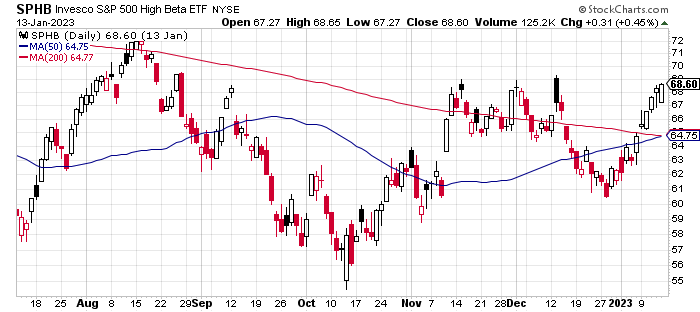It’s too early in the new year to draw hard conclusions, but the initial results for 2023 through the first half of January show a broad-based rally in most equity factors led by so-called high beta shares, based on a set of ETF proxies.
The strategy of holding stocks with the highest beta risk are up a sizzling 10.1% year to date through Friday’s close (Jan. 13) via Invesco S&P 500 High Beta ETF (SPHB). After last week’s rally, the fund closed near its highest level in months and currently tops the factor horse race in 2023 by a wide margin. After losing slightly more ground last year vs. the broad market (SPY), SPHB is outperforming stocks overall with a roaring rebound.

Small-cap value shares are also posting relatively strong results in the kickoff to the new year. Although this slice of the factor universe lost ground in 2022, small value’s slide was relatively light vs. the broad market’s haircut last year. For the moment, that outperformance edge remains intact via iShares S&P Small-Cap 600 Value ETF (IJS), which is up 8.3%, or roughly double the gain for the broad market benchmark (SPY) this year.

All the factor ETFs in the chart above are posting gains so far in 2023 with the exception of momentum (MTUM), which is flat at the moment. That’s a worrisome sign when you consider that the fund lost ground in line with the general market slide last year. The inability of MTUM to keep pace with a broad-based rally suggests the momentum factor faces relatively strong headwinds.
In fact, there’s no shortage of pitfalls for markets to navigate. In addition to the familiar troubles from the year just passed – inflation, rising interest rates, the war in Ukraine and recession risk – the new kid on the block is the threat of a US government shutdown and possible default.
So far, however, most slices of the US stock market are shrugging off the risks. Let’s see if the strong open continues. Whichever way January goes, the results will be viewed by some as a signal for the year ahead, according to the January effect. On that basis, the initial pop looks encouraging.
Learn To Use R For Portfolio Analysis
Quantitative Investment Portfolio Analytics In R:
An Introduction To R For Modeling Portfolio Risk and Return
By James Picerno